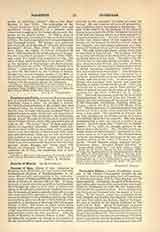

Faustinus and Jovita, SAINTS and MARTYRS, members of a noble family of Brescia; the elder brother, Faustinus, being a priest, the younger, a deacon. For their fearless preaching of the Gospel, they were arraigned before the Emperor Hadrian, who, first at Brescia, later at Rome and Naples, subjected them to frightful torments, after which they were beheaded at Brescia in the year 120, according to the Bollandists, though Allard (Histoire des Persecutions pendant les Deux Premiers Siecles, Paris, 1885) places the date as early as 118. The many “Acts” of these saints are chiefly of a legendary character. Fedele Savio, S.J., the most recent writer on the subject, calls in question nearly every fact related of them except their existence and martyrdom, which are too well attested by their inclusion in so many of the early martyrologies and their extraordinary cult in their native city, of which from time immemorial they have been the chief patrons. Rome, Bologna and Verona share with Brescia the possession of their relics. Their feast is celebrated on February 15, the traditional date of their martyrdom.
JOHN F. X. MURPHY

